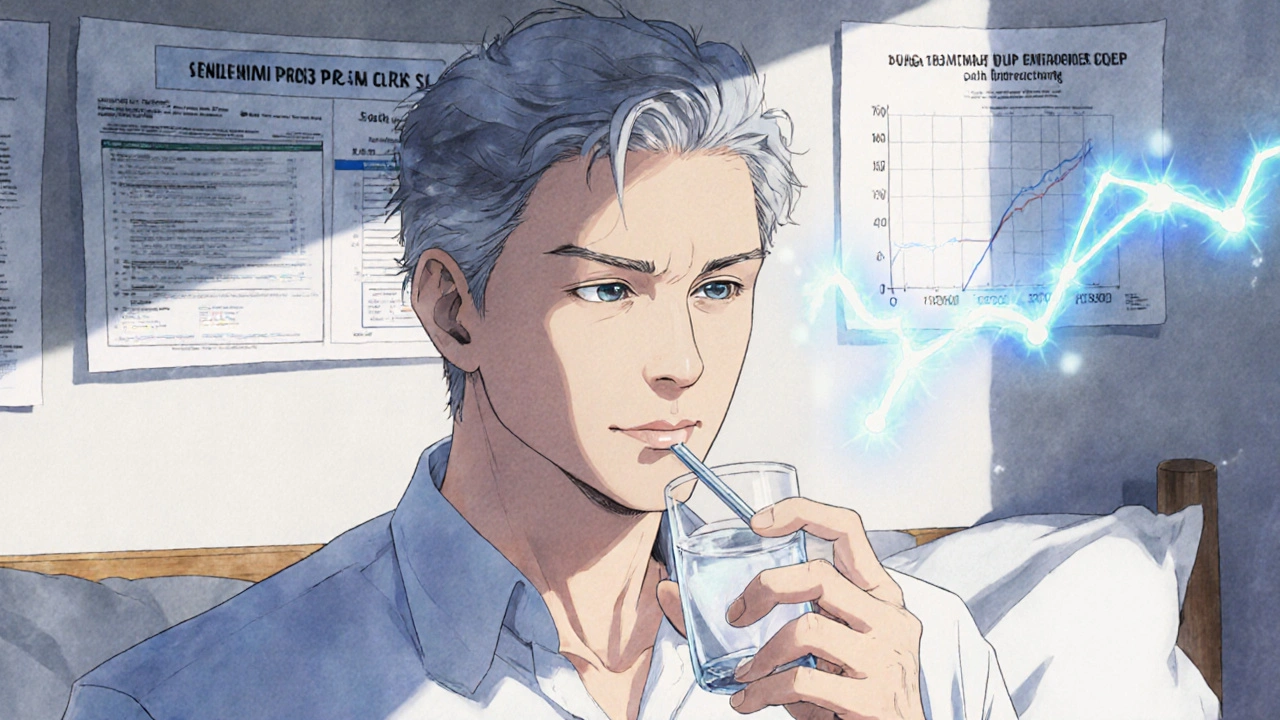
When prostate cancer spreads beyond the prostate gland, treatment becomes more complex. For many men with advanced prostate cancer, enzalutamide offers a meaningful chance to slow the disease, improve quality of life, and extend survival. Unlike older hormone therapies, enzalutamide works differently - and for many patients, that difference matters.
How Enzalutamide Works
Prostate cancer often feeds on testosterone and other male hormones. For years, doctors used drugs that lowered testosterone levels or blocked its production. But cancer cells eventually adapt. They find ways to keep growing even when hormone levels are low.
Enzalutamide is an androgen receptor inhibitor. It doesn’t just reduce testosterone. It blocks the hormone from attaching to cancer cells at all. Think of it like changing the lock on a door so the key - even if it’s still in your pocket - can’t turn. The cancer cell can’t respond to testosterone, no matter how much is around.
This mechanism makes enzalutamide effective even when other hormone treatments stop working. It’s used for castration-resistant prostate cancer - meaning the cancer keeps growing even after the testicles have been surgically removed or chemically shut down.
Who Benefits Most from Enzalutamide?
Not all prostate cancer patients are the same. Enzalutamide is approved for two main groups:
- Men with metastatic castration-resistant prostate cancer (mCRPC), whether they’ve had chemotherapy or not.
- Men with non-metastatic castration-resistant prostate cancer (nmCRPC) who are at high risk of their cancer spreading.
In clinical trials, men with nmCRPC who took enzalutamide saw a 71% reduction in the risk of their cancer spreading to other parts of the body. That’s not just a statistic - it means delaying bone pain, fractures, and the need for stronger treatments.
For those with mCRPC, studies show enzalutamide extends life by an average of 4 to 7 months longer than older hormone therapies. Some patients live much longer. One 2023 analysis of real-world data from over 3,000 patients showed that nearly 40% were still alive after three years on enzalutamide.
Real-World Benefits Beyond Survival
Survival is important, but so is how you live during treatment. Many men on enzalutamide report fewer symptoms like bone pain, fatigue, and urinary problems. They’re able to keep working, spending time with family, and doing things they enjoy.
Unlike chemotherapy, enzalutamide is taken as a daily pill. No IVs, no hospital visits, no hair loss. That alone makes a big difference in daily life. A 2024 survey of 1,200 men on prostate cancer hormone therapy found that 78% of those on enzalutamide said their quality of life stayed stable or improved over the first six months. Only 42% of those on older treatments said the same.
It’s not magic. Side effects happen. But they’re often manageable. Common ones include fatigue, hot flashes, and high blood pressure. Seizures are rare - less than 1 in 100 patients - but doctors screen for risk factors like past brain injuries or epilepsy before starting treatment.

How It Compares to Other Treatments
There are other drugs for advanced prostate cancer: abiraterone, apalutamide, darolutamide. All target the androgen pathway, but they’re not the same.
Enzalutamide has the most long-term data. It was the first of its kind approved for mCRPC in 2012. Since then, more than 500,000 men worldwide have used it. That’s a lot of real-world experience.
Compared to abiraterone, which requires taking steroids and has strict dietary rules (you can’t eat before or after taking it), enzalutamide is simpler. One pill a day, with or without food.
Apalutamide and darolutamide are newer and have similar benefits. But darolutamide has a lower risk of seizures and may be preferred for older patients or those with other health issues. Enzalutamide still leads in overall survival data across multiple studies.
| Drug | Dosing | Common Side Effects | Seizure Risk | Dietary Restrictions |
|---|---|---|---|---|
| Enzalutamide | 160 mg once daily | Fatigue, hot flashes, high blood pressure | Low (0.8%) | None |
| Abiraterone | 1,000 mg once daily + prednisone | Liver issues, fluid retention, low potassium | Very low | Yes - must take on empty stomach |
| Apalutamide | 240 mg once daily | Rash, fatigue, hypothyroidism | Low (1.2%) | None |
| Darolutamide | 600 mg twice daily | Fatigue, pain, decreased appetite | Lowest (0.2%) | None |
When Enzalutamide Isn’t the Best Choice
Enzalutamide works well for most men, but it’s not for everyone. If you’ve had a seizure in the past, or you’re on medications that lower the seizure threshold, your doctor may avoid it. People with severe liver disease also need careful monitoring.
Some men develop resistance to enzalutamide over time. When that happens, doctors may switch to chemotherapy, radioligand therapy (like lutetium-177 PSMA), or newer targeted drugs. But even then, enzalutamide often delays the need for those more intense treatments.
It’s also not used as a first-line treatment for early-stage prostate cancer. It’s designed for when the disease has progressed. Starting it too early doesn’t help - and might limit options later.

What to Expect When Starting Treatment
Most men start with one pill a day. Your doctor will check your liver function and blood pressure before you begin. You’ll likely have follow-up blood tests every few months to monitor PSA levels - a marker that shows if the cancer is responding.
Side effects usually show up in the first few weeks. Fatigue is the most common. Many patients find that taking the pill in the morning helps. If you feel unusually tired, don’t push through it. Rest. Talk to your doctor - sometimes a short break or dose adjustment helps.
Don’t stop taking it unless your doctor tells you to. Even if you feel fine, stopping early can let the cancer grow faster. Consistency is key.
Cost and Access
Enzalutamide is expensive. In the U.S., a month’s supply can cost over $10,000. But in Australia, it’s covered under the Pharmaceutical Benefits Scheme (PBS). Patients pay a maximum of $31.60 per script (or $7.70 with a concession card). That makes it accessible to nearly everyone who needs it.
Other countries have similar programs. In Canada, it’s covered by provincial drug plans. In the UK, it’s available through the NHS. Access varies, but in most high-income nations, it’s not out of reach.
Looking Ahead
Research continues. Scientists are testing enzalutamide earlier in treatment - even before chemotherapy - and combining it with new drugs like PARP inhibitors for men with specific genetic mutations. Early results are promising.
For now, enzalutamide remains one of the most reliable tools we have for advanced prostate cancer. It’s not a cure. But for many men, it turns a life-limiting diagnosis into a manageable condition - one where they can still live well, for longer.
Is enzalutamide a chemotherapy drug?
No, enzalutamide is not chemotherapy. It’s a hormone therapy that blocks testosterone from reaching cancer cells. Chemotherapy kills rapidly dividing cells throughout the body, which causes side effects like hair loss and nausea. Enzalutamide targets only the hormone pathway and doesn’t cause those effects.
How long can you stay on enzalutamide?
There’s no fixed time limit. Many men stay on enzalutamide for years, as long as it’s working and side effects are manageable. Doctors monitor PSA levels and imaging scans to check if the cancer is responding. If the cancer starts growing again, they may switch to another treatment.
Can enzalutamide cure prostate cancer?
No, enzalutamide cannot cure advanced prostate cancer. But it can control the disease for a long time - sometimes years. For many men, it delays progression, reduces symptoms, and extends life without the need for harsher treatments like chemotherapy.
Does enzalutamide affect fertility?
Yes. Enzalutamide lowers testosterone, which stops sperm production. If you plan to have children in the future, talk to your doctor before starting treatment. Sperm banking is an option worth considering.
What happens if I miss a dose?
If you miss a dose, skip it and take your next dose at the regular time. Don’t double up. Missing one dose won’t ruin your treatment, but regularly skipping doses can let the cancer grow. Set a daily alarm or use a pill organizer to stay on track.
Comments (8)
-
Zach Harrison November 1, 2025
Just started enzalutamide last month and honestly? It’s been way easier than I thought. No chemo vibes, no hair loss, just a pill I take with my coffee. Fatigue’s real though-had to switch to morning shifts at work. But hey, I’m still walking the dog every day. That’s a win.
-
Torrlow Lebleu November 3, 2025
Ugh, another enzalutamide fanboy post. Let’s be real-this drug’s just a fancy placebo with a $10k price tag. The survival benefit? Marginal. The side effects? Underreported. And don’t get me started on how they bury the seizure risk in tiny print. Pharma’s cash grab disguised as hope.
-
Christine Mae Raquid November 4, 2025
My uncle died on this drug. He was so tired all the time, couldn’t even hold his grandkids. And now you’re acting like it’s some miracle? I’m sorry, but I’m not buying the corporate PR. If this is what ‘living well’ looks like, I’d rather go fast.
-
Sue Ausderau November 5, 2025
There’s something quiet powerful about a pill that lets you keep your dignity. I’ve watched too many men lose themselves to treatment-hair, energy, laughter. Enzalutamide doesn’t promise a cure, but it gives space. Space to breathe, to laugh, to be. That’s not nothing.
-
Tina Standar Ylläsjärvi November 5, 2025
Hey everyone, just wanted to share-my dad’s been on enzalutamide for 2.5 years now. PSA’s stable, no new mets, and he’s still gardening and playing with his grandkids. Side effects? Yeah, hot flashes and tiredness, but he manages with naps and cool showers. He’s got a pill organizer and a daily alarm. Simple, but it works. If you’re considering it, talk to your oncologist about baseline BP and liver checks. And don’t skip doses-consistency is everything.
-
charmaine bull November 6, 2025
Just read the PBS cost thing-holy crap, Australia’s system is insane. $31.60 a month? Here in the US, my insurance made me appeal three times just to get it covered. And even then, I’m paying $800/month. How is this even legal? People are choosing between meds and rent. This isn’t healthcare, it’s extortion.
-
Terri-Anne Whitehouse November 8, 2025
Interesting how you all gloss over the fact that enzalutamide’s survival advantage is only statistically significant in trials with strict inclusion criteria. Real-world patients? Often older, comorbid, frail. The 4-7 month gain? That’s an average. Many see less. And the 2023 real-world data you cite? Retrospective, uncontrolled, and riddled with selection bias. Please, let’s stop romanticizing pharmaceuticals as if they’re benevolent angels.
-
M. Kyle Moseby November 9, 2025
Just take the pill. Don’t overthink it. If your body says no, stop. If it says yes, keep going. Simple.
